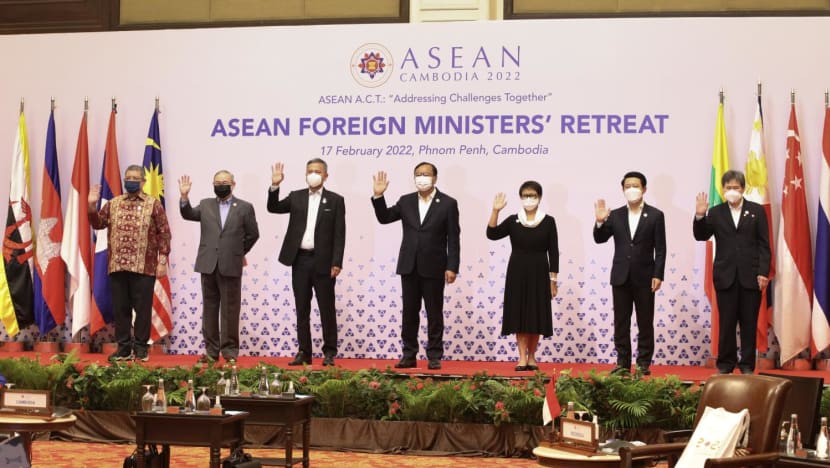ASEAN to continue taking 'principled position' on Myanmar, but the issue will not hijack the agenda: Vivian Balakrishnan

Group Photo of the ASEAN Foreign Ministers and ASEAN Secretary-General Dato Lim Jock Hoi at the ASEAN Foreign Ministers' Retreat in Phnom Penh on Feb 17, 2022. (Photo: Ministry of Foreign Affairs, Singapore)
PHNOM PENH: The Association of Southeast Asian Nations (ASEAN) will continue to take a “principled position” with regards to the situation in Myanmar, said Singapore Foreign Affairs Minister Vivian Balakrishnan on Thursday (Feb 17).
However, member states are determined not to allow the issue to "hijack" the ASEAN agenda, he added.
Speaking to reporters during a virtual media doorstop, Dr Balakrishnan said whilst ASEAN will not interfere, it will not give legitimacy to the actions which the military have taken and are inflicting on the people of Myanmar.
He noted that there will be “administrative wrinkles” such as how the regional bloc will interpret international agreements that ASEAN is party to, who gets to sign on behalf of Myanmar, and whether Myanmar will be able to enjoy the benefits.
“These are delicate issues which the lawyers and all the capitals are going to have to come to grips with,” he said.
“Whilst these are important, it's important not to lose the big picture that ASEAN is more than just one country ... It's not going to be stopped because one member is in turmoil,” he added.
Singapore has expressed disappointment over the lack of progress in the implementation of the Five-Point Consensus, which was agreed upon among the bloc’s leaders as well as Myanmar military chief Min Aung Hlaing in April last year.
The consensus includes ending violence, constructive dialogue among all parties, the appointment of a special ASEAN envoy to facilitate dialogue, the provision of humanitarian assistance, and a visit by the envoy to Myanmar.
The lack of progress on the consensus led Cambodia, which is the current chair of the 10-member bloc, to invite a non-political representative from Myanmar to attend the ASEAN Foreign Ministers’ Retreat, rather than the country's military-appointed foreign minister.
Responding to a question from the media on whether the exclusion of the Myanmar junta from the bloc’s meetings had any effect, Dr Balakrishnan emphasised that Myanmar remains a member of ASEAN.
“We've not even excluded ... the current military authorities from our meetings, in the sense that - even though we have said we are not inviting political representatives - even today, they dialled in, they had access to our meetings,” he said.
“I'm not sure I would call it an exclusion but I would call it conveying a signal, a signal of disappointment, of dismay, that despite the fact that our leaders arrived at a consensus in April last year, there has been absolutely no progress.”
Despite the situation, Dr Balakrishnan said he was not pessimistic about ASEAN, adding that the bloc continues to be a dynamic and high potential growth region, maintaining its relevance to superpowers and major countries in the world.
“Our challenge is to maintain our unity in the midst of the diversity and our relevance both on the international stage strategically and especially, economically,” he said.
Dr Balakrishnan was wrapping up a three-day official visit to Phnom Penh, where he attended the ASEAN Foreign Ministers’ Retreat and had bilateral talks with Cambodian leaders.
In a press release on Thursday, Singapore’s Ministry of Foreign Affairs (MFA) said the ministers had endorsed the appointment of Cambodian Deputy Prime Minister and Foreign Minister Prak Sokhonn as the ASEAN Chair’s Special Envoy on Myanmar during the retreat.
Singapore also emphasised the need for ASEAN and Myanmar to make “expeditious and substantive” progress in the implementation of the Five-Point Consensus, including by facilitating the Special Envoy’s visit to Myanmar to meet with all parties concerned.
MFA added that the ministers agreed that "until there was significant progress in implementing the consensus", ASEAN should maintain its decision of inviting a non-political representative from Myanmar to ASEAN meetings.
Besides the situation in Myanmar, the ministers also discussed issues related to ASEAN’s COVID-19 recovery efforts, regional economic integration and external relations.
This includes exploring cooperation, particularly on Smart Cities, the digital economy, cybersecurity and health.















